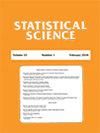与罗斯·普伦蒂斯的对话
IF 3.9
1区 数学
Q1 STATISTICS & PROBABILITY
引用次数: 0
摘要
Ross L.Prentice在滑铁卢大学获得理学学士学位,在多伦多大学获得博士学位。他于1974年加入华盛顿大学(UW)和弗雷德·哈钦森癌症研究中心(Hutch),目前是这些机构的生物统计学教授。他担任哈奇医院高级副院长兼公共卫生科学部主任超过25年。Prentice博士的专业知识和研究兴趣是生物统计学、流行病学和疾病预防领域。他在妇女健康倡议的构思、设计和实施中发挥了核心作用。在统计学和医学文献中,他有500多篇科学论文,其中40多篇引用次数达到或超过500次。他对人口和临床研究理论的重大贡献包括使用替代终点和病例队列设计,以及其他领域,如生存分析、营养流行病学、遗传流行病学、生物标志物和测量误差。普伦蒂斯博士因其对学生和初级同事的指导以及慷慨的合作而受到认可。普伦蒂斯博士的工作获得了许多奖项,包括滑铁卢大学的数学荣誉博士学位、美国统计协会的曼特尔流行病学统计终身贡献奖、美国公共卫生协会的莫蒂默·斯皮格尔曼奖、,统计学会主席委员会主席奖和RA Fisher奖、哈佛大学统计科学杰出成就马文·泽伦领导奖、美国癌症研究协会/美国癌症学会癌症流行病学和预防卓越研究奖、,以及美国癌症研究团队科学奖。1990年,他被选入美国国家医学院医学研究所。罗斯·L·普伦蒂斯授予的生物统计学协作教授职位于2005年在华盛顿大学设立,自成立以来每年都会颁发。哈奇公共卫生科学大楼的内部空间被命名为罗斯·L·普伦蒂斯中庭。在业余时间,罗斯喜欢运动,包括滑水、高尔夫、跑步,并与妻子迪迪、女儿、女婿和孙子孙女共度时光。从20多岁开始,他每天都在跑步,直到大约10年前膝盖出现问题。本次采访于2020年12月通过Zoom对李旭和查尔斯·库珀伯格进行。本文章由计算机程序翻译,如有差异,请以英文原文为准。
A Conversation with Ross Prentice
Ross L. Prentice received his B.Sc. from the University of Waterloo and his Ph.D. from the University of Toronto. He joined the University of Washington (UW) and the Fred Hutchinson Cancer Research Center (the Hutch) in 1974, and is currently Professor of Biostatistics at these institutions. He was Senior Vice President at the Hutch, and Director of its Public Health Sciences Division, for more than 25 years. Dr. Prentice’s expertise and research interests are in the fields of biostatistics, epidemiology, and disease prevention. He played a central role in the conception, design, and implementation of the Women’s Health Initiative. In statistical and medical literature he has over 500 scientific papers, including more than 40 with 500 or more citations. His substantial contributions to the theory of population and clinical research include the use of surrogate endpoints and case-cohort designs and other areas such as survival analysis, nutritional epidemiology, genetic epidemiology, biomarkers, and measurement error. Dr. Prentice is recognized for his mentoring of students and junior colleagues, and for his generous collaborations. Dr. Prentice has received numerous awards for his work, including an honorary doctorate in mathematics from the University of Waterloo, the Mantel Award for Lifetime Contributions to Statistics in Epidemiology from the American Statistical Association, the Mortimer Spiegelman Award from the American Public Health Association, the Committee of Presidents of Statistical Societies Presidents’ Award and RA Fisher Award, the Marvin Zelen Leadership Award for Outstanding Achievement in Statistical Science from Harvard University, the American Association of Cancer Research/American Cancer Society Award for Research Excellence in Cancer Epidemiology and Prevention, and the American Association for Cancer Research Team Science Award. He was elected to the Institute of Medicine/National Academy of Medicine in 1990. The Ross L. Prentice Endowed Professorship of Biostatistical Collaboration was created at the UW in 2005 and has been awarded every year since its inception. The interior space of the Public Health Sciences building at the Hutch has been named the Ross L. Prentice Atrium. In his spare time, Ross enjoys sports including water skiing, golf, running, and spending time with his wife, Didi, and with his daughters, sons-in-law, and grandchildren. He ran daily from when he was in his 20s until his knees objected about 10 years ago. This interview took place with Li Hsu and Charles Kooperberg via Zoom in December 2020.
求助全文
通过发布文献求助,成功后即可免费获取论文全文。
去求助
来源期刊

Statistical Science
数学-统计学与概率论
CiteScore
6.50
自引率
1.80%
发文量
40
审稿时长
>12 weeks
期刊介绍:
The central purpose of Statistical Science is to convey the richness, breadth and unity of the field by presenting the full range of contemporary statistical thought at a moderate technical level, accessible to the wide community of practitioners, researchers and students of statistics and probability.
 求助内容:
求助内容: 应助结果提醒方式:
应助结果提醒方式:


